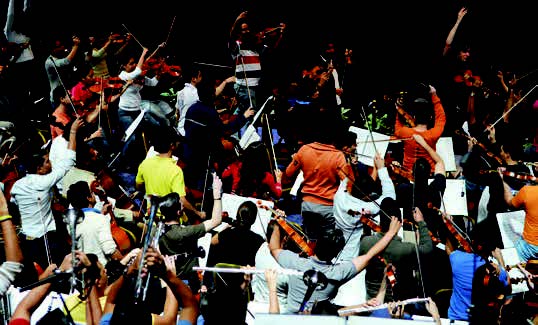Keep playing and injustice will pass you by. The ‘collective and democratic music’ experiment turns 40. El Sistema, one of the world’s most extraordinary democratic educational projects, is almost 40 years old.

In February 1975, with eight of his pupils in Caracas, Venezuelan concert pianist and economist José Antonio Abreu founded the first symphony orchestra aimed at giving kids from the city’s most underprivileged neighbourhoods the opportunity to play music together.
The idea was to get them off the streets, as the saying goes, but it was more than that, as Abreu explains: “When a poor child starts playing an instrument at home, they transform the people around them too. Their commitment is an example to others, and if they leave their neighbourhood to play in public, their self-esteem improves as well”.
‘Play and fight!’ is the project’s motto, which quickly spread throughout the country and is now imitated the world over. In Venezuela, at least 400,000 children currently belong to hundreds of orchestras across the country, and over the years a similar number has attended local community music schools (called ‘nucleos’), where kids are given a free instrument, study five days a week and teachers go from house to house to rustle up their pupils.
Conductors Simon Rattle and Carlo Abbado have actively participated in the project. For Britain’s Rattle, El Sistema is “the most important thing for the future of classical music”. His words took on new meaning in 2006, when the then 25-year-old conductor of the Simon Bolivar Youth Orchestra, Gustavo Dudamel, was selected as music director of the Los Angeles Philharmonic, thus occupying the conductor’s podium once home to Otto Klemperer, Zubin Mehta and Carlo Maria Giulini.
Now in his thirties, Dudamel is also Honorary Conductor of the Gothenburg Symphony Orchestra, and is on tour with Milan’s La Scala for the bicentenary celebrations of Verdi’s birth. The son of a salsa trombonist, his interest in classical music was kindled by his grandmother. He trained as a violinist in the Caracas Nucleo and was personally chosen by Abreu to lead the Sistema’s main orchestra. “It’s my family”, he says.
“I’ll never forget them”. Dudamel’s repertoire ranges from Mozart to Shostakovich and Verdi (his rendition of the ‘Requiem’ in Los Angeles was one of the events of last summer), and he conducts with such innocence and power that very few find fault in his performance. Dudamel reminds some of Leonard Bernstein: less radical chic but equally capable of anti-elitist gestures, such as reserving the best seats in LA’s Walt Disney Concert Hall for the (underprivileged) families of his young musicians rather than for VIPs. Marketing takes care of the rest: you can now buy mugs and t-shirts sporting his famously unruly locks.
A pop star conductor is one way for the tradition of classical music to survive in the cutthroat cultural market, especially in America, and attract allimportant funding. Yet El Sistema has always been publicly financed. Displaying canny political skill, Abreu – a Catholic who also served as Venezuela’s Minister of Culture in the 1980s – secured the roughly $30 million a year his baby needs to survive, placing it under the auspices of the Ministry of Education.
While president, Hugo Chavez called the Simon Bolivar Orchestra one of his country’s splendours during a 2000 summit in Brasilia. “We are a national institution”, says Abreu, “whoever is in government. And we’re part of the community: local administrations compete with each other to have the best orchestra”. Young people can escape the barrios (shantytowns) through sports, or through music, though it’s usually hip-hop or pop.
The stories told by many musicians who have been through the Sistema – some, like Dudamel, going on to play in major international orchestras – are very similar to those of their rapper contemporaries or some South American footballers. There have been thousands of documentaries and reportages about their experiences. When asked where they would have been now without music, the usual response is: on the streets smoking crack or dead.
Trumpet player Wilfrido Galarraga, whose alcoholic father was driving his family to ruin, once admitted that by playing Mussorgsky at home in front of astonished neighbours, he managed to persuade his brothers to go back to school and his father to stop drinking. The aim of El Sistema – to use western classical music to save children from a future as thieves and drug dealers – is absurdly simple. It smacks of a bygone age, when access to culture (with a capital C) was a sign of emancipation and democracy. It smacks of Franklin Roosevelt and Italian priest Don Milani, both famous for providing poor children with an education. Abreu was inspired by Beethoven’s democratic humanism to create something that could “vindicate the rights of the masses”.
In his method, an orchestra works as a place where competition and cooperation between all its members meet, like a small and infectious utopia come true. Another of El Sistema’s mottos is “Passion first, refinement second”. Joy and passion are the keywords for this re-interpretation of our classical music, which has unexpected effects, and not only in the social and aesthetic spheres.
Neuroscientist Antonio Damasio is planning to observe the young musicians of the Simon Bolivar Orchestra for five years, searching for the neurological secret to explain how music can “reduce individual pain and produce joy”.
Keep playing and injustice will pass you by. The ‘collective and democratic music’ experiment turns 40. El Sistema, one of the world’s most extraordinary democratic educational projects, is almost 40 years old.





